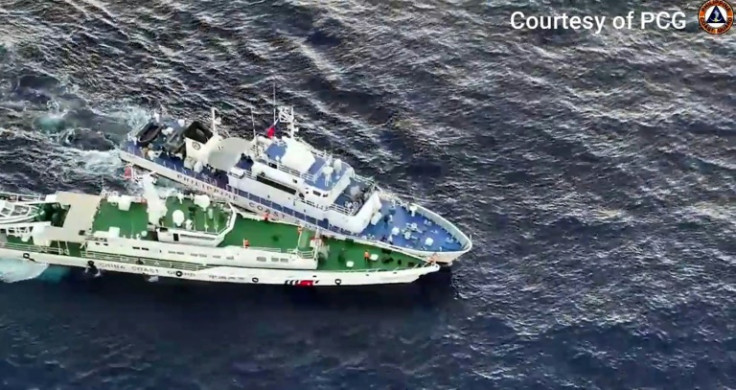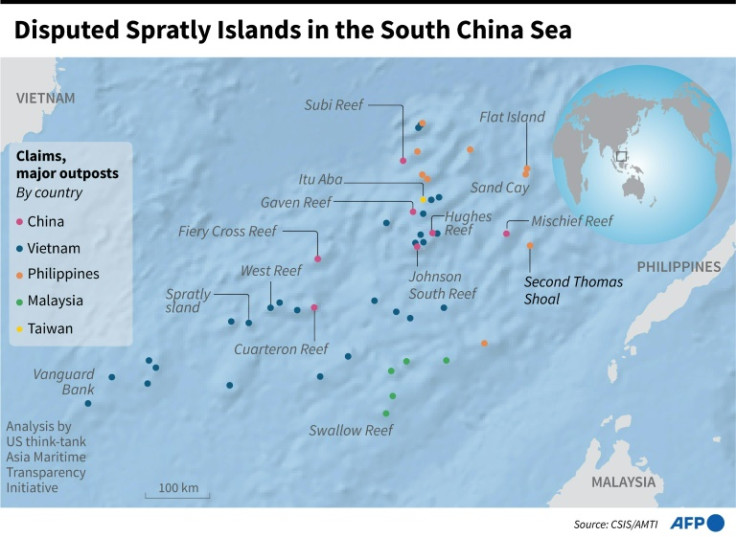Philippines Says Crew Hurt, Vessels Damaged By China Coast Guard

The Philippines said Tuesday that China Coast Guard vessels caused two collisions with Philippine boats and water cannoned one of them, leaving four crew injured during a resupply mission in the South China Sea.
The incidents happened in waters around Second Thomas Shoal in the Spratly Islands where the countries have contesting maritime claims.
A Philippine government task force said in a statement that "China Coast Guard and Chinese Maritime Militia vessels harassed, blocked, deployed water cannons, and executed dangerous maneuvers in another attempt to illegally impede or obstruct a routine resupply and rotation mission".
The China Coast Guard said it "took control measures" against Philippine ships' "illegal intrusion" in waters around the shoal.
The BRP Sindangan, along with a sister ship, had been deployed to support the military chartered Unaizah May 4 and Unaizah May 1 boats carrying replacement soldiers and supplies to Second Thomas Shoal, where Filipino troops are stationed on a grounded Philippine navy vessel, the BRP Sierra Madre.
Four crew on board the Unaizah May 4 were injured when two China Coast Guard ships simultaneously fired water cannon at it, shattering the windshield, the National Task Force for the West Philippine Sea said in a statement.
It said a China Coast Guard vessel also caused a "minor collision" with the Unaizah May 4, which turned back to shore without delivering its cargo.
The Unaizah May 1 was able to unload its provisions, which the troops on the BRP Sierra Madre depend on for their survival.
Earlier in the morning, the task force added, a China Coast Guard vessel caused a separate "minor collision" with one of the Philippine Coast Guard ships that was escorting the supply boats.
China Coast Guard spokesman Gan Yu accused the Philippine Coast Guard ship of "intentionally" ramming the Chinese boat, causing a "minor scrape".
Chinese foreign ministry spokeswoman Mao Ning said Beijing had expressed "strong protests" over the run-in with the Filipino vessels which were "attempting to transport construction supplies and building materials" to the decrepit Sierra Madre.
China claims almost the entire South China Sea, brushing aside competing claims from a host of Southeast Asian nations and an international ruling that has declared its stance baseless.
The incident comes a day after Philippine Foreign Minister Enrique Manalo called on China to "stop harassing us" as he defended Manila's strategy of publicising Chinese manoeuvres in the South China Sea.
Philippine President Ferdinand Marcos was similarly forthright when he appeared later Monday evening at an event hosted by an Australian think tank.
"We shall never surrender even a square inch of our territory and our maritime jurisdiction," he said on the sidelines of the ASEAN summit in Melbourne.
Tuesday's collisions and water cannoning came after similar incidents in December. Those confrontations were the most intense between Philippine and Chinese vessels in years.
Beijing is trying to "break our resolve, basically warn us that this will lead to further escalation," political science professor Renato de Castro of Manila's De La Salle University told AFP on Tuesday.
Relations between Manila and Beijing have frayed under Marcos, who has sought to improve ties with traditional ally Washington and deepen defence cooperation in the region, while also pushing back against Chinese actions in the South China Sea.
That contrasts with the approach of former president Rodrigo Duterte, who set aside maritime disputes with Beijing in exchange for promises of Chinese investment.
US ambassador to the Philippines MaryKay Carlson condemned China's "dangerous maneuvers" in a post on social media platform X, saying they "endangered lives, resulted in injuries, and damaged (Philippine Coast Guard) vessels".
Luc Veron, the EU envoy to Manila, said on X he was "troubled" by China's efforts to target "Philippine vessels engaged in crucial resupply missions".
Political analyst Richard Heydarian said the Chinese actions could also "further drive anti-China sentiment in the Philippines and encourage the Marcos administration to double down on its alliance with the West and traditional partners".
"Of course it could eventually... (lead) to a horrible accident or an extremely violent incident that could really escalate out of control in ways that is not only detrimental to the Philippines but also to the supposedly stronger party," he told AFP.

© Copyright AFP 2025. All rights reserved.





















